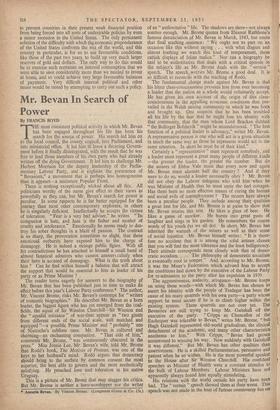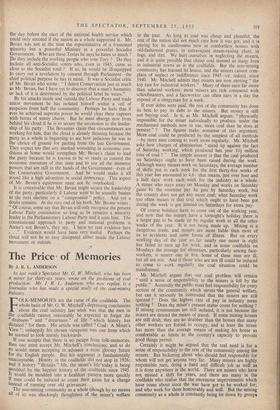Mr. Bevan In Search of Power
By FRANCIS BOYD THE most consistent political activity in which Mr. Bevan has, been engaged throughout his life has been his search for the source of power. His search led him on to the local council, the county council, into Parliament, and into ministerial office. It led him to leave a decaying Govern- ment before it finally disintegrated, with the result that he was free to lead those members of his own party who had already written off the dying Government. It led him to challenge Mr. Herbert Morrison for the deputy leadership of the Parlia- mentary Labour Party, and it explains the persistence of " Bevanism," a movement that is perhaps less homogeneous than it appears—a miniature Popular Front. There is nothing exception-ally wicked about all this. All politicians worthy of the name give effect to their views as powerfully as they can, but Mr. Bevan's search for power is peculiar. In some respects he is far better equipped for the journey than most other contemporary explorers; in others he is singularly deficient. Intellectually he accepts the virtues of toleration. ' Fear is a very bad adviser," he writes. 'Its companion is hate, and hate is the father and mother of cruelty and intolerance." Emotionally he seems ready to des- troy his sober thoughts in a blaze of passion. The contrast is so sharp, the provocation sometimes so slight, that these emotional outbursts have exposed him to the charge of demagogy. He is indeed a strange public figure. With all his contradictions he has attached to himself a small band of almost fanatical admirers who cannot answers calmly when their hero is accused of demagogy. What is the truth about him ? Can he find within himself a balance that will attract the support that would be essential to him as leader of his party or as Prime Minister ? , The reader turns eagerly for answers to the. biography 9f Mr. Bevan that has been published just in time to make an effect before this year's Labour Party conference.* The author, Mr. Vincent Brome, risks Mr. Bevan's contempt for " writers of romantic biographies."- He describes Mr. Bevan as a born leader, the biggest figure who has yet emerged from the coal- fields, the equal of Sir Winston Churchill—Sit Winston and the " squalid nuisance " of war-time appear as " two giants from different ends of the social scale, well matched and equipped "—a possible Prime Minister and " probably " one of Nietzsche's sublime ones. Mr. Bevan is cultured and charming—an enchanting companion. " That side of him," comments Mr. Brome, " was continuously obscured in the press." Miss Jennie Lee, Mr. Bevan's wife, told Mr. Brome that Rod6's book, The Motives of Proteus, was one of the keys to her husband's mind. Rod6 argues that democracy should bring to the surface by common consent the most superior, the best able to govern and the most aesthetically satisfying. He preached love and toleration in his native Uruguay. This is a picture of Mr. Bevan that may stagger his critics. But Mr. Brome is neither a hero-worshipper nor the writer * Anenrin Bevan. By Vincent Brome. (Lungmans Green & Co. 15s.) .of an " authoritative " life. The shadows are there—not always sombre enough. Mr. Brome quotes from Eleanor Rathbone's famous denunciation of Mr. Bevan in March, 1943, but omits that final scathing ,sentence: " We ought not to part on an occasion like this without saying . . . with what disgust and almost loathing we watch this kind of temperament, these cattish displays of feline malice." Nor can a biography be said to be authoritative that deals with a critical episode in the subject's life as Mr. Brome deals with the " vermin " speech. The speech, worries Mr. Brome a good deal. It is so difficult to reconcile with the teaching of Rod& The fundamental charge made against Mr. Bevan is that his bitter class-consciousness prevents him from ever becoming a leader that the nation as a whole would voluntarily accept. He has given his own account of the origin of this class- consciousness in the appalling economic conditions that pre- vailed in the Welsh mining community, in which' he was born and brought up. Qne suspects that he has been troubled all his life by the fear that he might lose. his identity with that &immunity, that the man whom Lord Bracken dubbed " the Bollinger Bolshevik " might be misunderstood. " The first function of a political leader is advocacy," writes Mr. Bevan. A representative person is one who will act in a given situation in much the same way as those he represents would act in the same situation. In short he must be of their kind."
Certainly a " representative " must represent somebody, and a leader must represent a great many people of different kinds —the greater the leader, the greater the number. But do the miners of Ebbw Vale insist that every now and again Mr. Bevan must alienate half the country ? And if they were to do so, would a leader necessarily obey ? Mr. Bevan did not obey the Labour delegates who told him -when he was Minister of Health that he must untie the tied cottages. Has there been no more effective means of curing the human and social evils of unemployment ? The miners have always been a peculiar people. They include among their qualities a great zest for life, and Mr. Brome is at pains to show that Mr. Bevan retains this zest. He likes a glass of beer. He likes a game of snooker. He bursts into great gusts of laughter and sings in his garden. He remembers the coarse words of his youth (as we all do). In short, Mr. Bevan has inherited the warmth of the miners as well as their sense of social injustice. Mr. Bevan himself writes: " It is there- fore no accident that it is among the solid artisan classes that you will find the most tolerance and the least belligerency. Their attitude corresponds most closely with that of demo- cratic socialism. . . . The philosophy of democratic socialism is essentially cool in temper:" And, according to Mr. Brome, it was the Miner's Federation which advised him to accept the conditions laid down by the executive of the Labour Party for re-admission to the party after his expulsion in 1939. The aggressiveness, audacity, arrogance—Mr. Brome keeps on using these words—with which Mr. Bevan has chosen to assert his identity with the people of Tredegar has been the cause of his many quarrels withhis own party—a party whose support he must secure if he is to climb higher within the existing system. These quarrels are not over yet. The Bevanites are still trying to keep Mr. Gaitskell off the executive of the party. "Cripps as Chancellor of the Exchequer was tolerable to Bevan," writes Mr. Brome, " but Hugh Gaitskell represented old-world gradualism, the clinical detachment of the academic, and many other characteristics anathema to him." With Cripps, " Bevan had grown accustomed to winning his way. Now suddenly with Gaitskell it was different." But Mr. Bevan has other qualities than assertiveness. He is a skilled Parliamentarian, persuasive and patient when he so wishes. He is the most powerful speaker in the House after Sir Winston Churchill. His confident speeches as Minister of Health were a constant stimulus to the bulk of Labour Members. Labour Ministers have not apparently always found him equally stimulating. , His relations with the world outside his party, have been bad. The " vermin " speech showed them at their worst. This speech was not made in the heat of furious controversy but on the day before the start of the national health service which could only succeed if the nation as a whole supported it. Mr. Bevan was not at the time the representative of a frustrated minority but a powerful Minister in a powerful Socialist Government. Who are these Tories he says he hates so much ? po they include the working people who vote Tory ? Do they include all anti-Socialist voters who, even in 1945, came so close to the Socialist total ? If so, he would be ill-equipped to carry out a revolution by consent through Parliament—the chief political purpose he has in mind. It was a Socialist critic of Mr. Bevan who wrote : " I detest ConServatism just as much as Mr. Bevan, but I have yet to discover that a man's humanity or lack of it is determined by the political label he wears."
By his attacks inside and outside the Labour Party and trade union movement he has isolated himself within a veil of suspicion from half the community. Perhaps he feels that if Over he achieved supreme power he would clear these vapours With bursts of sunny charm. But he must emerge now from behind his cloud if he is to secure the succession to the leader- ship of his party. The Bevanites claim that circumstances are working for him, that the cloud is already thinning because the party as a whole is beginning to see how judicious he was in the choice of ground for parting from the late Government. They expect too that any Marked worsening in economic con- ditions at home would strengthen Mr. Bevan's claim to lead the party because he is known to be so ready to control the economic resources of that state and to use all the immense powers that are still in the hands of the Government—even of the Conservative Government. And he would make it all sound like a high adventure in social democracy. This aspect of Mr. Bevan's equipment must not be overlooked. It is conceivable that Mr. Bevan might secure the leadership of the party, particularly if Labour were to be soundly beaten at the next election on a " compromise " policy. And yet a doubt remains. At the very end of his book, Mr. Brome writes : "Of course, some say that Bevan will only recognise the present Labour Party constitution so long as he remains a minority leader in the Parliamentary Labour Party and it suits him. The constitutional approach to party and national problems is Attlee's not Bevan's, they say. I have no, real evidence here . . ." Evidence would have been very useful. Perhaps the Cloud will not be so easy dissipated either inside the Labour movement or outside.



































 Previous page
Previous page